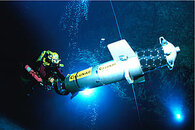A lot of myths and the equivalent of urban legends have been circulated about rebreathers. Before believing them, I would suggest doing some research, talking to some rebreather instructors, and then trying out some of the units that are on the market. Then, you can decide if making the switch is the right thing for you.
On the research front, I would suggest investing in
Understanding Rebreathers, written by Jeff Bozanic. (In some versions, the book was printed with the title,
Mastering Rebreathers. Other than the title, both books are the same.) Second, I would suggest ordering back issue number 25 of
Advanced Diver Magazine. Read my article, "Transition to Rebreather Diving." I think that you will find this article very useful because it explains how I went from thinking about becoming a rebreather diver to deciding to make the switch. The article is also available for download from my
web site. There are also links to the above book and other related publications.
As far a Brazil is concerned, I know two excellent CCR instructors there that can take you as far as you want to go on a rebreather (including full cave, etc.). They can tell you about the costs, parts and repairs in your area.
There has been some good information in this thread, and there has also been a spreading of the urban legends about rebreathers. Unless you know, it can be hard to tell which is which. This is why research and consultation with an expert (a
real expert) is so important in reaching your decision.
Rebreathers are certainly not for everybody (at this point). However, they can enhance your dive and safety if they are the right match for you. For the diligent diver, they can be
safer than open circuit scuba. (
Tom Mount). Good luck in your search.





